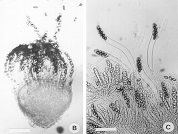Systematic and biological study of Ascobolaceae of Argentina XIX. Two new species of Ascobolus (Ascomycota)
Keywords:
Diversity, Fungi, Ascobolus, DevelopmentAbstract
In the present contribution, two new species of Ascobolus are described: A. campanensis sp. nov. and A. bonaerensis sp. nov. Both species are heterothallic and belong to section
Dasyobolus. Ontogenetic studies showed a “cleistohymenial” ascocarp development which generally opens at late “telohymenial” phase. In darkness neither fructifications are formed nor esporulation occurs in A. bonaerensis; however in A. campanensis ascomata are formed with ascospores without perisporium, few paraphyses and hymenial mucilage that difficults ascocarp opening and ascospore discharge.

Downloads
Published
2004-05-27
How to Cite
Dokmetzian, D. A., Gimenez, M. C., Cinto, I. E., & Ranalli, M. E. (2004). Systematic and biological study of Ascobolaceae of Argentina XIX. Two new species of Ascobolus (Ascomycota). Hickenia, 3, (50): 205–211. Retrieved from https://www.hickenia.darwin.edu.ar/index.php/hickenia/article/view/66
Issue
Section
Artículos
License

This work is licensed under a Creative Commons Attribution-NonCommercial-ShareAlike 4.0 International License.

